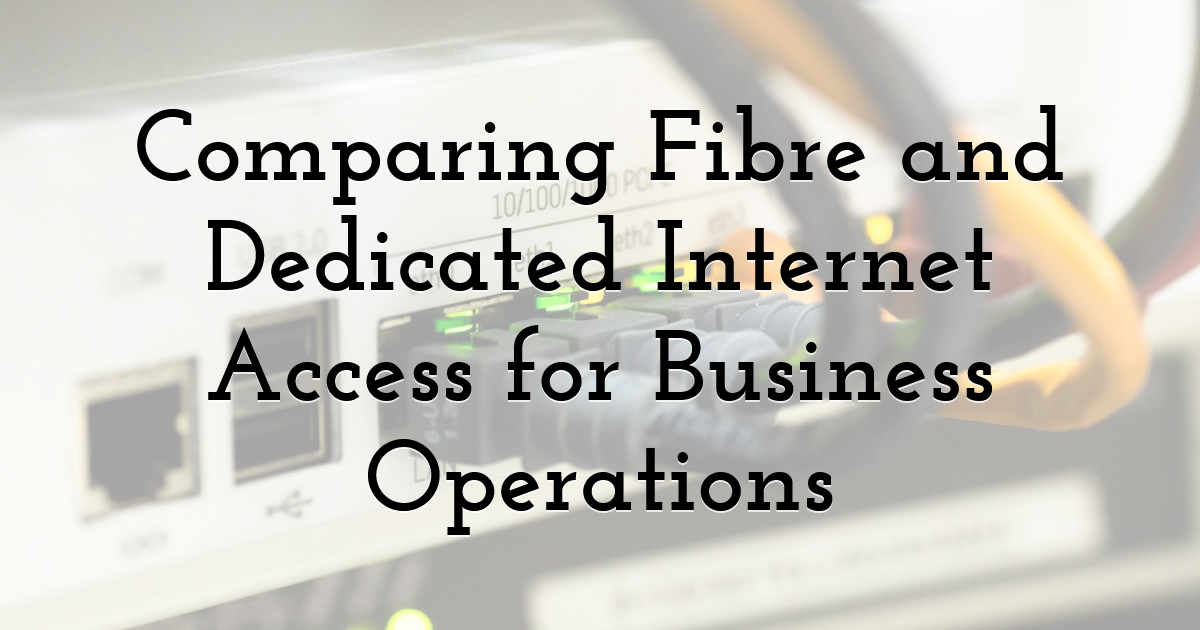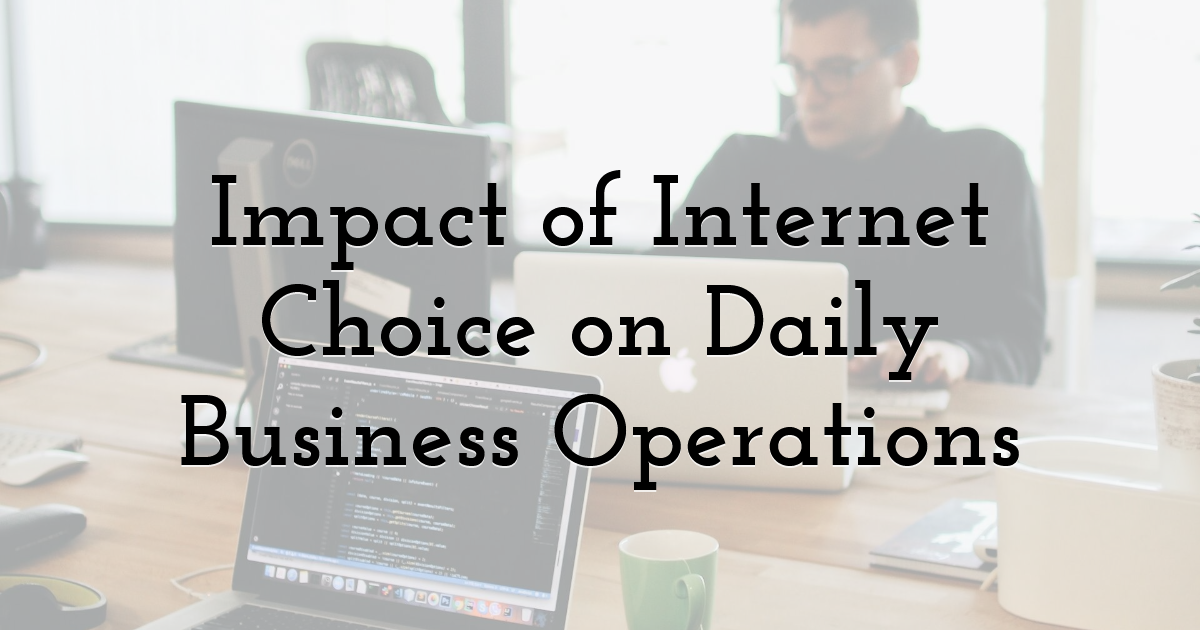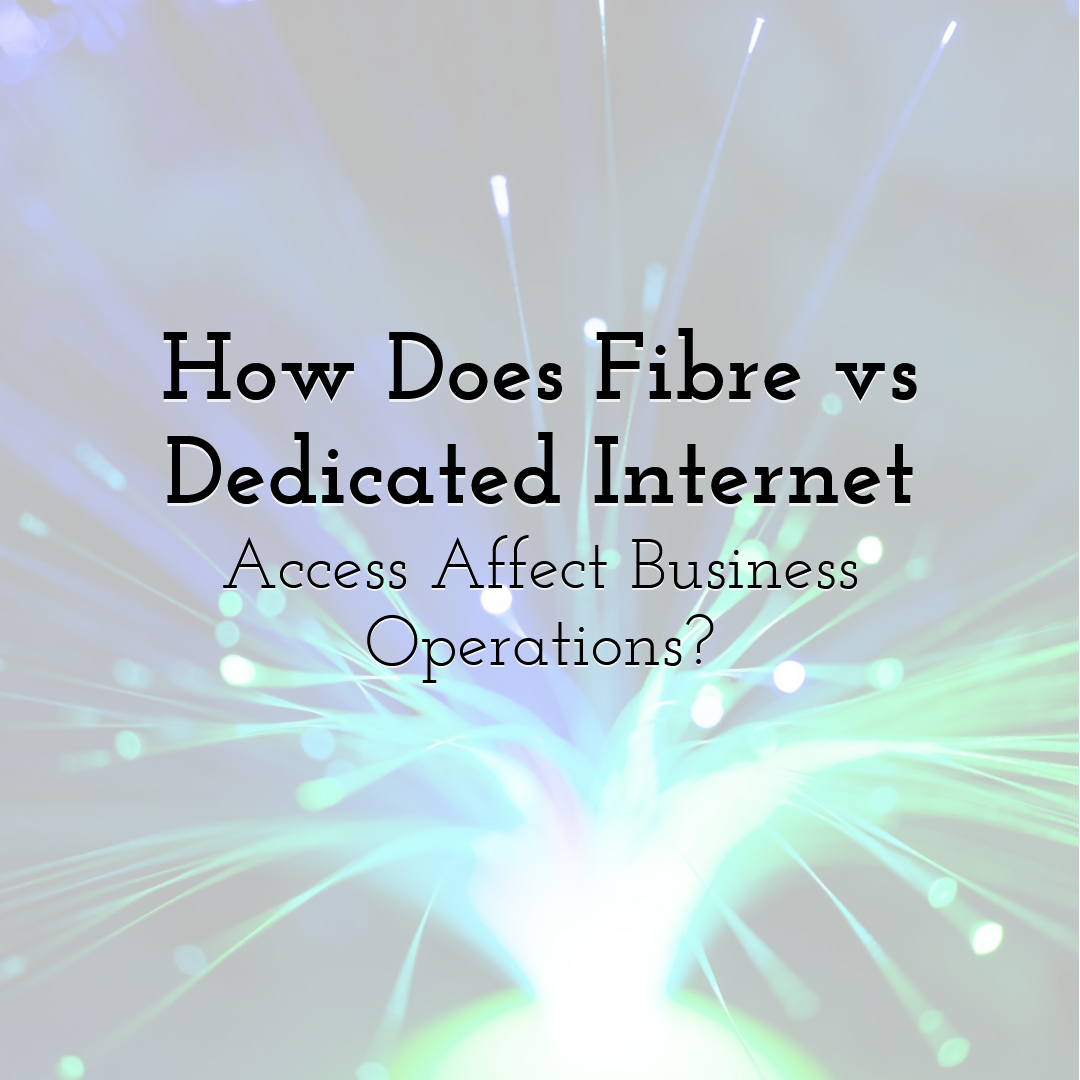How Does Fibre vs Dedicated Internet Access Affect Business Operations?
Business internet choices directly impact daily operations in ways many companies don't fully understand. Fibre and dedicated internet access create vastly different experiences for employees, affecting everything from video calls to cloud software performance and overall productivity.
The type of internet connection a business selects determines whether teams can work smoothly or face constant slowdowns. Shared fibre connections divide bandwidth among multiple users in an area, while dedicated access provides a private connection exclusively for one organization. This fundamental difference shapes how well business applications perform during peak usage times.
Companies often focus only on internet speed when making decisions, but connection type affects much more than download rates. The choice between shared and dedicated access influences security, uptime guarantees, scalability options, and long-term costs that can make or break operational efficiency.
Comparing Fibre and Dedicated Internet Access for Business Operations

Business internet options fall into two main categories: shared fibre connections that split bandwidth among multiple users, and dedicated internet access that provides exclusive bandwidth. The choice between these options affects everything from daily productivity to long-term scalability.
Speed, Bandwidth, and Performance: Symmetrical vs Asymmetrical Connections
Shared fibre typically offers asymmetrical connections with faster download speeds than upload speeds. Download speeds might reach 100 Mbps while uploads stay at 10-20 Mbps. This works for basic web browsing and email, but creates problems for cloud backups or video calls.
High-speed internet for your business through dedicated access provides symmetrical speeds. Upload and download speeds match exactly. A 100 Mbps connection delivers 100 Mbps in both directions.
Bandwidth Allocation:
- • Shared fibre: Advertised speeds represent the maximum possible, not guaranteed
- • Dedicated access: Advertised speeds are guaranteed minimums
Real-World Performance:
- • Shared networks slow down during peak hours (9 AM - 5 PM)
- • Dedicated connections maintain consistent speeds 24/7
Latency also varies between connection types. Shared networks can experience delays of 50-100 milliseconds during busy periods. Dedicated connections typically maintain latency under 20 milliseconds consistently.
Fundamental Differences Between Broadband and Dedicated Internet
Shared fibre internet uses infrastructure that serves multiple businesses in the same area. This means bandwidth gets divided among all users on the network. During busy hours, speeds can drop significantly as more people connect.
Dedicated internet access provides a private connection exclusively for one business. No other companies share the bandwidth. This creates consistent performance throughout the day.
Cost Structure:
- • Shared fibre: Lower monthly fees, shared infrastructure costs
- • Dedicated access: Higher monthly fees, private infrastructure investment
Performance Consistency:
- • Shared fibre: Variable speeds based on network usage
- • Dedicated access: Guaranteed speeds regardless of time or usage patterns
The infrastructure setup also differs between these options. Shared connections use existing networks that service entire neighborhoods or business districts. Dedicated lines require separate equipment and routing specifically for one location.
Reliability, Uptime, and the Role of Service Level Agreements
Service Level Agreements (SLAs) define the performance standards a provider must meet.
Shared fibre services rarely include formal SLAs or offer basic agreements with minimal guarantees.
Dedicated internet access comes with detailed SLAs that specify:
- • Uptime guarantees: Usually 99.5% to 99.9%
- • Response times: How quickly technicians address issues
- • Performance standards: Minimum speed and latency requirements
- • Compensation: Credits when service falls below standards
Uptime Comparison:
- • Shared fibre: 95-98% typical uptime, no guarantees
- • Dedicated access: 99.5-99.9% guaranteed uptime with penalties for failures
Network monitoring differs significantly between these services. Dedicated connections include 24/7 monitoring with proactive issue detection. Shared networks rely on reactive support that responds after problems occur.
Recovery time also varies. Dedicated services typically restore connections within 4-8 hours. Shared network repairs can take 24-72 hours depending on the scope of issues affecting multiple customers.
Impact of Internet Choice on Daily Business Operations

The type of internet connection a business chooses directly affects how smoothly employees can work each day. Shared connections may slow down during busy hours, while dedicated access provides steady performance for important tasks.
Effect on Cloud Applications and Business-Critical Services
Shared internet connections create problems for businesses that depend on cloud applications. When multiple companies share the same bandwidth, performance drops during peak hours.
Cloud-based CRM systems may load slowly or crash during important client calls. File uploads to cloud storage can take much longer than expected.
Dedicated internet access gives businesses guaranteed bandwidth. This means cloud applications run at the same speed all day long.
Upload speeds and download speeds stay the same whether it's 9 AM or 3 PM. Teams can access their tools without waiting or dealing with crashes.
The difference becomes clear when employees try to work with large files. Shared connections might take 10 minutes to upload a presentation. Dedicated connections complete the same task in 2 minutes every time.
VoIP, Video Conferencing, and Real-Time Collaboration
Business internet quality directly affects phone calls and video meetings. VoIP systems need steady upload speeds to work properly.
Shared connections often cause these problems:
- • Choppy audio during phone calls
- • Video that freezes mid-sentence
- • Calls that drop unexpectedly
- • Poor sound quality that makes meetings hard to follow
Latency issues happen more often with shared connections. When someone speaks, there might be a 2-3 second delay before others hear them.
Dedicated internet access solves these problems by providing consistent bandwidth. Video conferencing works smoothly because the connection doesn't compete with other businesses.
Teams can hold important client meetings without worrying about technical problems. Remote workers stay connected without dropped calls or frozen screens.
Scalability, Security, and Long-Term Considerations
Growing businesses face different challenges with each connection type. Shared internet becomes less helpful as companies add more employees.
Adding 10 new workers to a shared connection often means everyone experiences slower speeds. The same bandwidth gets divided among more people.
Dedicated internet access scales better because businesses can increase their bandwidth as needed. Companies get exactly what they pay for without sharing with others.
Security differences also matter for daily operations. Shared networks expose businesses to more risks from other users on the same system.
Most dedicated internet access plans include Service Level Agreements (SLAs). These guarantee specific uptime and speed levels.
If the connection goes down, businesses get credits or faster repairs. Shared connections usually don't offer these protections.
Long-term costs often favor dedicated access despite higher monthly fees. Businesses avoid lost productivity from slow connections and technical problems.
Final Thoughts:
Choosing between fiber broadband and dedicated internet access depends on your business size and needs. Small businesses with basic internet requirements often find shared fiber connections sufficient for daily operations.
Medium to large enterprises benefit more from dedicated internet access. These businesses need consistent speeds, better security, and guaranteed uptime for their operations.
The key factors to consider include your budget, number of employees, and how much your business depends on internet connectivity. Dedicated connections cost more but provide better performance and service agreements.
Until next time, Be creative! - Pix'sTory
Recommended posts
-

How Does Fibre vs Dedicated Internet Access Affect Business Operations?
Read More › -

Evaluating Text-Em-All in 2025: What You Need to Know
Read More › -

How Computer Vision with AI Improves Business Efficiency
Read More › -

From Complexity to Clarity: How Visuals Help Businesses Scale
Read More › -

Top Design Templates for Your Business
Read More › -

Are You Concerned About The Way Your Business Is Performing? Changes May...
Read More ›
